These 7 Key Principles are Inherent within the Alexander Technique,
Feldenkrais Method, and Yoga
Principles
#1. Use and Functioning:
What we are doing in our daily life will affect everything we do. Metaphorically speaking, "If your guitar is out of tune, then the music you play will be out of tune...no matter how skilled you are at guitar playing”. The way you "use yourself" dictates, "you’re functioning.
#2. The Whole Person:
We function as one total unit with a 'central nervous system' ... change can only occur when we approach the human being from "the whole to the part" ... not the other way around.
#3. Primary Coordination:
The coordination of the Head, Neck, Back relationship in movement.
#4. Unreliable Sensory Appreciation:
Our sensory perception is conditioned by our "habits of movement.” Sometimes a new approach to learning might not ‘feel’ right in the beginning.
#5. Inhibition:
The biological definition of this word is our ability to say 'No' to a stimulus...creating a space between the stimulus and our response...i.e. stopping at a curb to "stop, look and listen" before crossing the road.
#6. Direction:
A process of coming back into "postural balance" through the process of saying 'No' or inhibiting the patterns that are preventing the balance from occurring. This can be applied to any movement activity...athletics, walking, sitting and standing, working at the computer, or performance of any kind.
#7. Ends and Means:
You gain your end result by an 'unfolding of the moment to moment process' within this present moment. However, when you primarily focus on the end result by using unnecessary force and pushing, this is called End Gaining and ultimately leads to failure. Everything is a ‘process’ creating a Means-Whereby leading to the end result. In sports, this is what is meant by playing in The Zone. This process calls on us to understand and be present within the process, and each intermediary step, required to achieve an aim. To put it most succinctly, “to conquer a problem, you don’t work on the problem, you work on yourself as you face the problem”.


